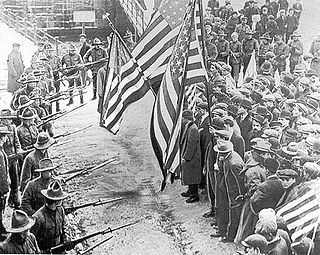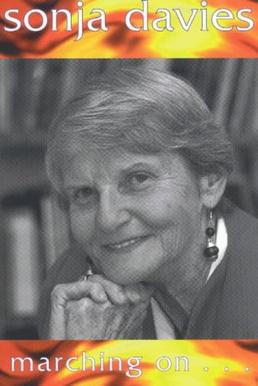ABC are the first three letters of the Latin script.
David Davies may refer to:
A rainbow is a meteorological phenomenon that appears as a multicolored arc that forms with the sunlight reflecting water.

"Bread and Roses" is a political slogan as well as the name of an associated poem and song. It originated in a speech given by American women's suffrage activist Helen Todd; a line in that speech about "bread for all, and roses too" inspired the title of the poem Bread and Roses by James Oppenheim. The poem was first published in The American Magazine in December 1911, with the attribution line "'Bread for all, and Roses, too'—a slogan of the women in the West." The poem has been translated into other languages and has been set to music by at least three composers.

The Lawrence Textile Strike, also known as the Bread and Roses Strike, was a strike of immigrant workers in Lawrence, Massachusetts, in 1912 led by the Industrial Workers of the World (IWW). Prompted by a two-hour pay cut corresponding to a new law shortening the workweek for women, the strike spread rapidly through the town, growing to more than twenty thousand workers and involving nearly every mill in Lawrence. On January 1, 1912, the Massachusetts government enforced a law that cut mill workers' hours in a single work week from 56 hours, to 54 hours. Ten days later, they found out that pay had been reduced along with the cut in hours.

Rose Schneiderman was a Polish-born American labor organizer and feminist, and one of the most prominent female labor union leaders. As a member of the New York Women's Trade Union League, she drew attention to unsafe workplace conditions, following the Triangle Shirtwaist Factory fire of 1911, and as a suffragist she helped to pass the New York state referendum of 1917 that gave women the right to vote. Schneiderman was also a founding member of the American Civil Liberties Union and served on the National Recovery Administration's Labor Advisory Board under President Franklin D. Roosevelt. She is credited with coining the phrase "Bread and Roses," to indicate a worker's right to something higher than subsistence living.
An arena is an enclosed area that showcases theatre, musical performances or sporting events.

Sonja Margaret Loveday Davies was a New Zealand trade unionist, peace campaigner, and Member of Parliament. On 6 February 1987, Davies was the third appointee to the Order of New Zealand.

Margarita Mimi Baez Fariña was an American singer-songwriter and activist, the youngest of three daughters of mother Joan Chandos Bridge and Mexican-American physicist Albert Baez. She was the younger sister of the singer and activist Joan Baez.
Respect is a positive feeling or action shown towards someone or something considered important.

Bread and Roses is a 2000 film directed by Ken Loach, starring Pilar Padilla, Adrien Brody and Elpidia Carrillo. The plot deals with the struggle of poorly paid janitorial workers in Los Angeles and their fight for better working conditions and the right to unionize. It is based on the "Justice for Janitors" campaign of the Service Employees International Union (SEIU), and the lead union organizer, Sam Shapiro, is based on SEIU organizer Jono Shaffer.
Cinema of Unease: A Personal Journey by Sam Neill is a documentary about the history of New Zealand cinema written by Sam Neill and co-directed by Neill and Judy Rymer. The film was released in 1995, and was New Zealand's contribution to the British Film Institute's Century of Cinema series. The title refers to the dark and brooding nature of many of New Zealand's most notable films, which Neill considers a reflection of the nation's struggle to find, or form, its own identity. The film screened in the 1995 Cannes Film Festival, and won Best Documentary in the 1996 TV Guide Film and Television Awards of New Zealand.
Noise is any unwanted sound. More broadly, noise (spectral phenomenon) describes many types of random or unwanted signals, which are listed in that article with related topics.

Redwatch was a British website associated with members of the far-right British People's Party. It published photographs of, and personal information about, alleged far left and anti-fascist activists. It typically targeted activists in political parties, advocacy groups, trade unions and the media. The website's slogan was "Remember places, traitors' faces, they'll all pay for their crimes", a quote from neo-Nazi musician Ian Stuart Donaldson.
Wow, WOW or WoW may refer to:
The Bread and Roses Heritage Festival is an annual, open-air festival in Lawrence, Massachusetts that celebrates labor history, cultural diversity, and social justice. It is a free, day-long event featuring live music and dance, children’s activities, theater and spoken word performances, walking and trolley tours, ethnic food, Lawrence History Live! and information from local organizations involved in social justice issues. The Bread And Roses Heritage Committee produces the event. The festival has occurred every year on Labor Day since its inception in 1986. Bread and Roses is the only broadly multicultural festival in Lawrence, the Immigrant City. The festival's name refers to the "Bread and Roses strike" of 1912, when over 20,000 immigrant workers in Lawrence, Massachusetts protested wage cuts for over two months, led by the Industrial Workers of the World. The strike was notable for its short-term success, despite ethnic divisions among the workers and the preponderance of women among the protesters.

The Communist Party of Great Britain (CPGB) was the largest communist organisation in Britain and was founded in 1920 through a merger of several smaller Marxist groups. Many miners joined the CPGB in the 1926 general strike. In 1930, the CPGB founded the Daily Worker. In 1936, members of the party were present at the Battle of Cable Street, helping organise resistance against the British Union of Fascists. In the Spanish Civil War, the CPGB worked with the USSR to create the British Battalion of the International Brigades, which party activist Bill Alexander commanded.
Bread and Roses is a 1993 biographical film showing significant episodes in the political life of socialist and feminist Sonja Davies, based on her autobiography of the same name. She is portrayed from her early years to her election to the Nelson Hospital Board. Made as a Suffrage Year tribute to the women of New Zealand. Helen Martin says the film is fascinating as a social history, showing her empathy with working class women. The film was shown on television in four episodes in October 1993.

Kenneth Charles Loach is a British film director and screenwriter. His socially critical directing style and socialism are evident in his film treatment of social issues such as poverty, homelessness, and labour rights.








